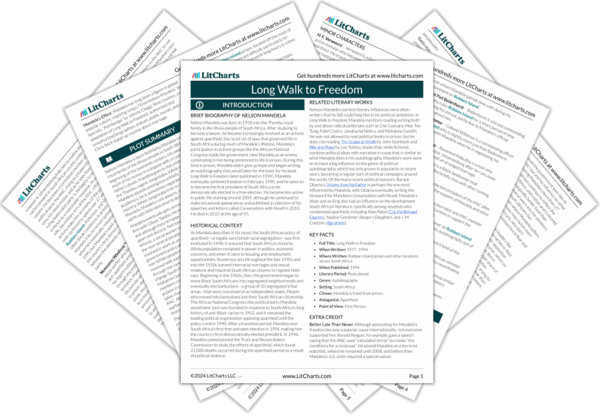Xhosa Quotes in Long Walk to Freedom
Apart from life, a strong constitution, and an abiding connection to the Thembu royal house, the only thing my father bestowed upon me at birth was a name, Rolihlahla. In Xhosa, Rolihlahla literally means “pulling the branch of a tree,” but its colloquial meaning more accurately would be “troublemaker.” I do not believe that names are destiny or that my father somehow divined my future, but in later years, friends and relatives would ascribe to my birth name the many storms I have both caused and weathered. My more familiar English or Christian name was not given to me until my first day of school.
My time at Clarkebury broadened my horizons, yet I would not say that I was an entirely open-minded, unprejudiced young man when I left. I had met students from all over the Transkei, as well as a few from Johannesburg and Basutoland, as Lesotho was then known, some of whom were sophisticated and cosmopolitan in ways that made me feel provincial. Though I emulated them, I never thought it possible for a boy from the countryside to rival them in their worldliness. Yet I did not envy them. Even as I left Clarkebury, I was still, at heart, a Thembu, and I was proud to think and act like one.
I entered the court that Monday morning wearing a traditional Xhosa leopard-skin kaross instead of a suit and tie. The crowd of supporters rose as one and with raised, clenched fists shouted “Amandla!” and “Ngawethu!” The kaross electrified the spectators, many of whom were friends and family, some of whom had come all the way from the Transkei. Winnie also wore a traditional beaded headdress and an ankle-length Xhosa skirt.
I had chosen traditional dress to emphasize the symbolism that I was a black African walking into a white man’s court. I was literally carrying on my back the history, culture, and heritage of my people.
The High Organ was the source of some controversy because of its ethnic composition: all four permanent members were from Xhosa backgrounds. This was a matter of coincidence rather than design; the senior ANC leadership on the island, the only four to have served on the National Executive Committee, happened to be Xhosa. It would not have been proper to take a less senior comrade and put him on the High Organ simply because he was not a Xhosa. But the fact that the High Organ was Xhosa-dominated disturbed me because it seemed to reinforce the mistaken perception that we were a Xhosa organization.












